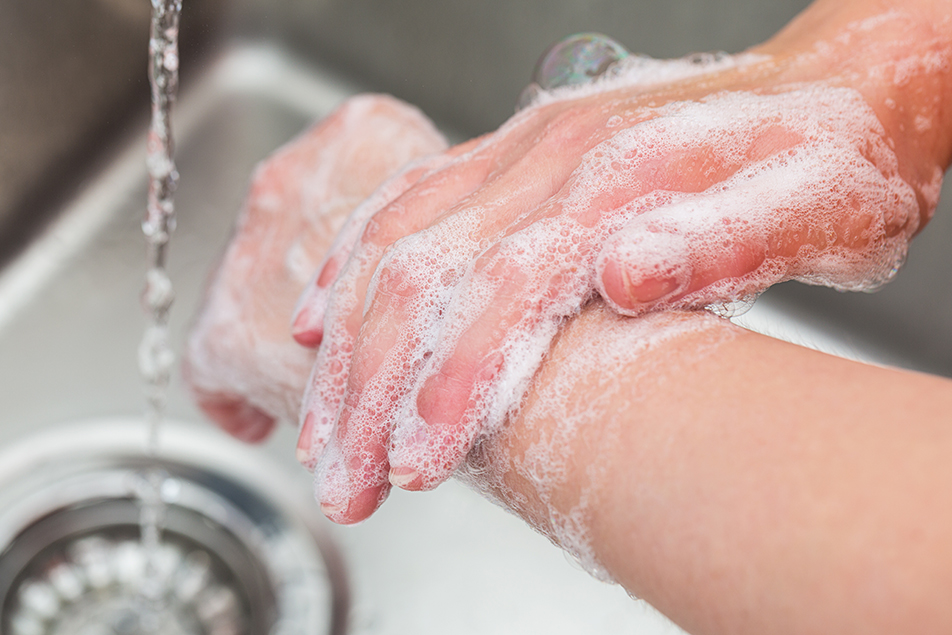
The holidays in full swing, and so is cold and flu season with its inevitable spreading of germs. Handwashing is one of the easiest forms of prevention but is often overlooked or forgotten. Scott Stienecker, MD, PPG - Infectious Disease Services, stresses the importance of proper hand hygiene during this social season.
Why is handwashing important?
Hand washing is the single most effective method of preventing the spread of germs. The vast majority of illness-causing germs are spread from the mouth and nose to the hands and the things we touch.
When should you wash your hands?
You should always wash your hands after touching your mouth or nose, after using the restroom, before and after cooking and before eating.
What is the proper handwashing technique?
There are many techniques you can utilize to obtain proper hand hygiene, but they are all essentially the same and include the following:
- Wet your hands in running water.
- Apply a generous amount of soap.
- Scrub hands for a full 30 seconds.
For a more thorough cleaning, be sure to wash between fingers and under fingernails, rub the palms and back of each hand ten times and sing Yankee Doodle Dandy for two revolutions.
Does the temperature of the water matter?
There is no conclusive data or evidence to show whether hot water is more effective or beneficial than cold. No matter the temperature, washing your hands with soap and water is always a key step in preventing the spread of germs.
Is soap really that important or can I wash with water alone?
It may feel like you’re getting clean by simply rinsing your hands, but they’re just as dirty as they were before. Why? Because bacteria and viruses have tiny electrical charges that make them adhere to skin, so water alone is an ineffective disinfecting solution. By utilizing soap when washing you’re able to break down and dissolve the fats and oils that may hide and protect germs from water alone.
Is one better than the other (liquid gel vs. foaming vs. bar)?
No. When properly used, all these forms of soap can be effective.
Can alcohol-based hand sanitizers be used instead of handwashing with soap?
In most cases, an alcohol-based hand sanitizer, with at least 60% alcohol by volume, can be more effective than soap and water as long as there is no visible debris on your hands.
Is it better to dry my hands with a disposable towel or clean cloth?
A single-use, disposable paper towel is the most effective method of hand drying and preventing the spread of germs. Clean cloths and towels are fine, but you run the risk of not knowing when a cloth was last laundered, who used it last and what they’ve been touching. There’s also evidence showing air hand dryers to be huge culprits in contaminating and exposing our hands to bacteria because they develop fungus and dirt on the fan blades, which in turn, is blown onto our hands during the drying process.
Is it okay to use a hand cream or would you advise against it?
It’s a mixed bag. The utilization of lotions and hand creams can protect the skin, keeping it from cracking and reducing the risk of infection. However, the sharing of lotions and hand creams can be a sure-fire way to spread germs.
How often should you wash your hands if you will be serving food?
You should always wash your hands before putting on or taking off disposable serving gloves and immediately after touching raw meat or produce. It’s important to remember, you can control and help prevent the spread of germs and illness to others by frequent handwashing, especially after touching your mouth and nose or after a cough or sneeze.
Do you have to wear gloves when serving others food, even after proper handwashing?
If you are at home and with your immediate family, no. They share your germs. In a professional setting, yes, most definitely.
Is handwashing necessary if you wear gloves to serve food?
Absolutely, gloves are not armor or magical shields. They have holes and can still transfer germs from one place to another.
What does handwashing protect us from and help to prevent?
Handwashing can go a long way in assisting in the protection and prevention from innumerable contaminates, but a few are:
- Respiratory viruses like the flu and colds
- Gastrointestinal tract (GI) viruses like norovirus or Hepatitis A
- Foodborne bacteria like Campylobacter, Salmonella, Shigella, Yersinia – infections with these organisms can cause bloody diarrhea during the actual infection then arthritis syndromes that start months later and can last for 3-6 months
- Toxins and poisons found in the environment that can be washed away
What would happen if you didn’t wash your hands?
Every day we’re exposed to countless contaminates. Hand washing is crucial in preventing the contraction of diseases and the spread of germs or illnesses to others. If you chose not to wash your hands you will inevitably contract those contaminates and transmit those organisms to others.
While it’s true, not all germs are bad, the majority of “bad” germs tend to come from mouths, noses, the GI tract and raw meat. Common sense and cleanliness have helped us progress to where we are today: living longer, healthier and better-quality lives. The life expectancy in 1820 was 41 years of age and in 1920 it was 59. Today, life expectancy is 76 years old for men and 81 years for women.



